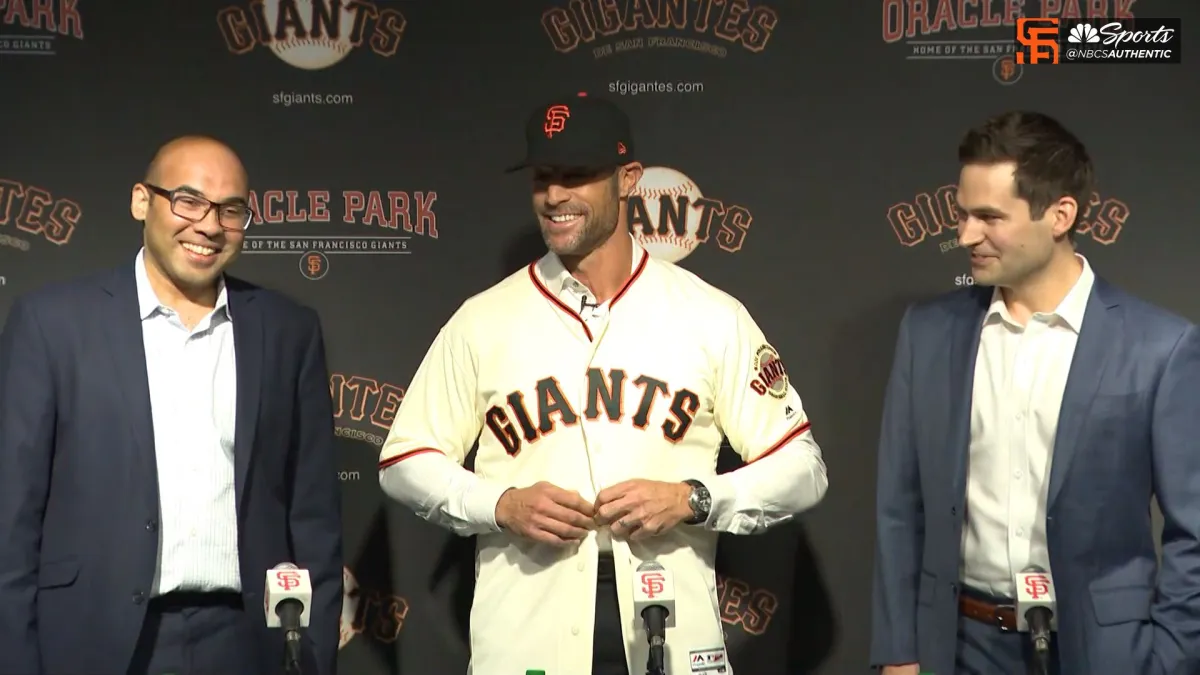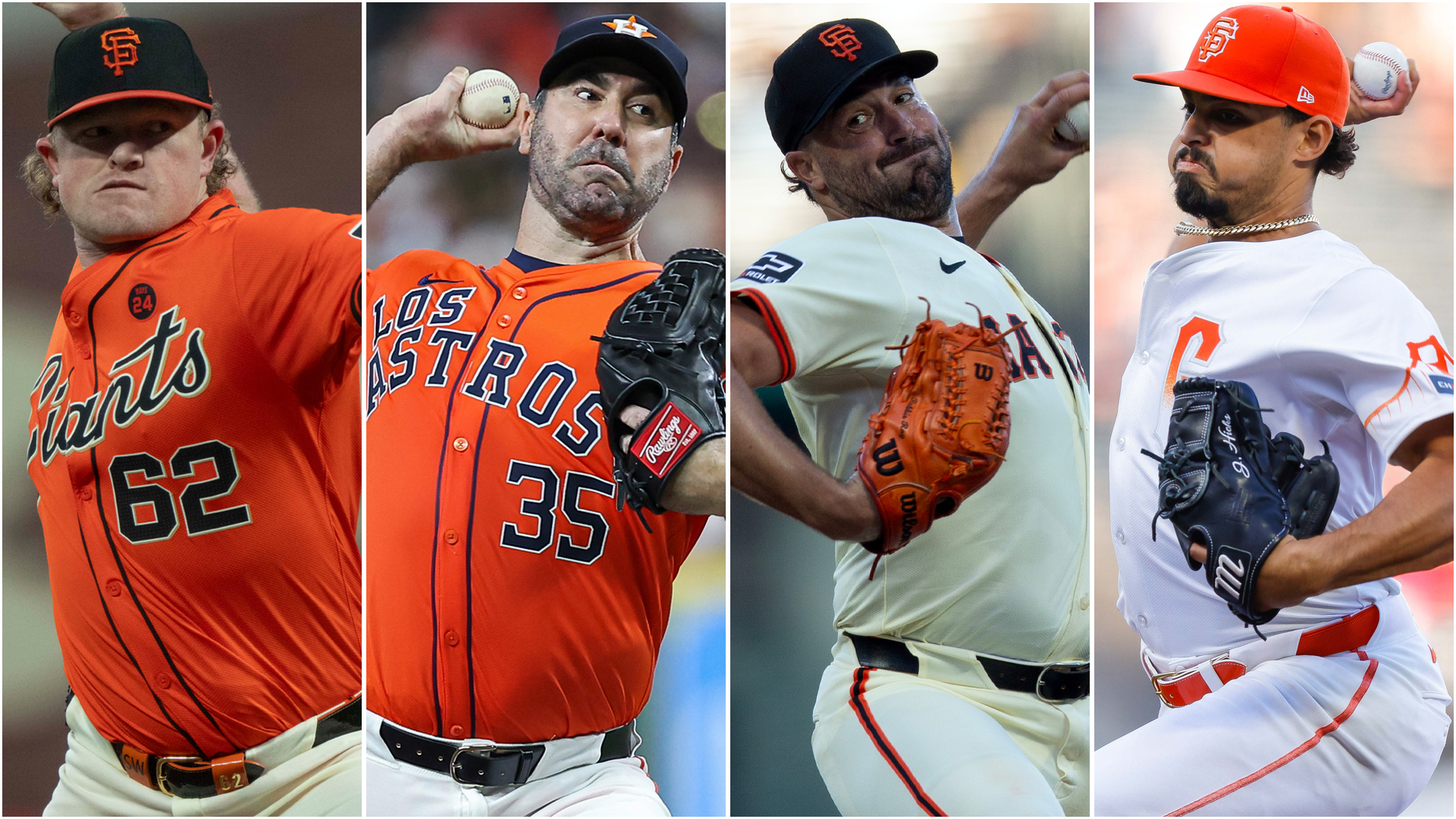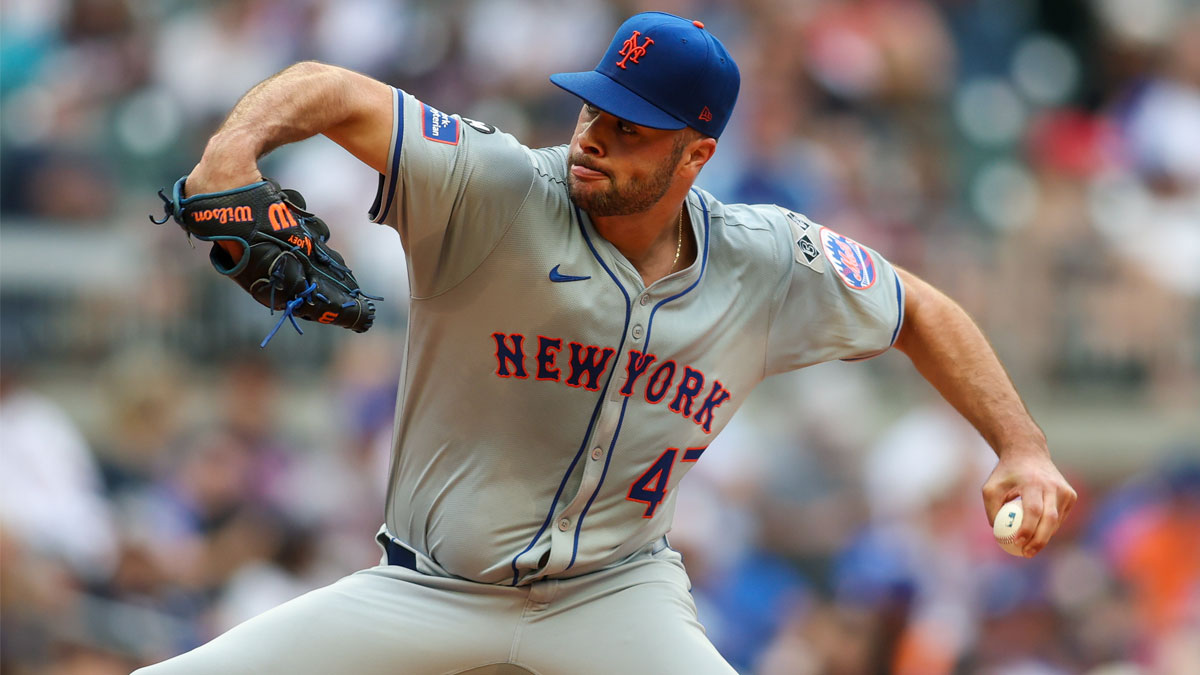
SAN FRANCISCO -- At 12:04 p.m. on Wednesday afternoon, Gabe Kapler put on his No. 19 Giants jersey for the first time and pulled a black cap over his head. He turned to Farhan Zaidi, his longtime friend and new boss, and smiled.
"I always feel much more confident in a jersey and a hat than I do in a blazer, so this is really nice to put this on," Kapler said.
Kapler, Zaidi and general manager Scott Harris posed for photos and then sat down at a podium for a press conference that was unlike anything anyone could remember. The new Giants brain trust spoke for 58 minutes, and more than half of that time was spent explaining their roles in an assault controversy regarding the Los Angeles Dodgers and taking related questions from reporters who spoke for an incensed fan base.
Stay in the game with the latest updates on your beloved Bay Area and California sports teams! Sign up here for our All Access Daily newsletter.
The Giants knew the Kapler hire would not be popular, but they were a bit surprised by the level of rage on social media Tuesday night. They knew there were plenty of questions to be answered, but they were a bit taken back by the length of the discussion Wednesday.
For most of the hour, Kapler and Zaidi took turns addressing the allegations against Dodgers minor leaguers. They promised to be better with the Giants, and they both apologized.
"I think this is the right time to say that I'm sorry that I didn't make all the right moves," Kapler said. "Everything that I did I acted on from a place of goodness and from my heart and wanting to do the right thing, but I was naive, I was in over my skis and trying to do things on my own when it was very clear that I needed counsel and I needed counsel from people like I've met in this community over the last two weeks."
"I think what we've come to understand is that this is not a situation where these incidents and what you do afterwards are just about protecting victims, but really about supporting them," Zaidi said. "I don't think we did enough in that regard and I've had to reflect on that, and I'm truly sorry that I didn't do more."
San Francisco Giants
Find the latest San Francisco Giants news, highlights, analysis and more with NBC Sports Bay Area and California.
The Giants took the issues seriously when Kapler became a candidate after getting fired by the Phillies, vetting Kapler and going back over MLB's previous investigation of the Dodgers. The Giants' legal department contacted Major League Baseball in early October. The league's response was that Kapler was not at fault, that he took the advice of legal counsel in Los Angeles. Since the 2015 incident involving a 17-year-old and two Dodgers prospects, MLB has changed its reporting procedures for potential acts of domestic violence and sexual assault.
Zaidi, the former Dodgers general manager, said he was aware of the incidents at the time. They did not come up when Zaidi interviewed with the Giants last year, but much of the last month was spent revisiting Kapler's role.
"Gabe never tried to hide anything. The incidents that happened, he reported up the chain of command, within baseball operations. The baseball operations group referred him to legal counsel in L.A. and everything we did from that point forward was done collectively as an organization," Zaidi said in his opening remarks Wednesday. "In those cases, I think it's important to note that, again, as an organization and in concert with the legal counsel, we did approach the victims and ask about reporting these incidents to the police.
"We respected the victims' wishes with whatever we decided to do in that case. I just feel very strongly about stating that there was never an attempt to cover anything up."
Kapler was the Dodgers' director of player development in 2015 when he received an email from a woman saying her granddaughter had been assaulted in the hotel room of two Dodgers prospects. A week later, the girl told police that she had also been sexually assaulted. Eight months after the first incident, Kapler was made aware of another allegation of sexual assault by a Dodgers prospect.
Zaidi said Kapler has documentation supporting every move he made during that time and that the MLB investigation corroborated everything Kapler has said about his role. As the Giants conducted their own deep dive over the past month, they became confident that the issues went well beyond Kapler. There was disbelief about the advice Dodgers' lawyers gave members of the front office.
Giants officials walked parallel paths as they interviewed Kapler. They spent weeks vetting him, but also used that time to talk to experts in the field of abuse and sexual assault and learn more about what Kapler, Zaidi and the rest of the Dodgers' front office had done wrong.
Zaidi said he learned he did not ask the right questions four years ago and did not seek advice from leaders in the field, as he should have. He expressed regret at the plan back then, which was to report the incident internally, follow legal advice, and offer the ability to contact the police.
"In talking to members of the community we realized that was an inadequate response," Zaidi said. "What we've come to realize is not only should we have sought help from people who were experts in the field, but we should not have stopped with the notion of reporting these incidents to police."
Kapler said he spent much of the last month discussing the situation with his mother, who was a civil rights activist. Looking back, he wishes he had done that in 2015.
"If I could go back and do some of the Dodgers stuff different, I probably would have called my mom and asked her a few more questions about which steps to take," he said.
There is no way for Kapler and Zaidi to go back and try to fix their mistakes, but both pledged to learn from the experience and overhaul the way they handle education within the Giants organization. Zaidi said MLB's guidelines for education and training do not go far enough and that the Giants would invest significant time and energy in that area going forward.
The allegations against Dodgers prospects were appalling, but it would be naive to believe the issues were limited to one organization. The Giants have had their own incidents over the years, and Kapler vowed to change the way he has conversations with his players.
"These are problems in Major League Baseball clubhouses," Kapler said. "Farhan mentioned that he hasn't done enough. I know he's speaking for himself personally, but I certainly haven't done enough and the industry hasn't done enough. It takes people willing to have those first conversations with players about what's important for us and what we're going to stand for in our clubhouse."
[RELATED: Kapler plans to use Bochy as resource]
Zaidi is in the second year of a five-year contract and Kapler is one day into a three-year deal. The two spoke passionately Wednesday, and they now will have the opportunity to act off the field as they try to build a winning product between the lines.
If you listened to only the baseball conversation on Wednesday, Kapler came across as energetic, intelligent and open-minded. He talked passionately about how much he likes watching Brandon Belt's long plate appearances and said he can't wait to sit down with all of his pitchers and discuss the ways they like to attack hitters.
From a baseball perspective, Kapler was a breath of fresh air. But his first day on the job was not about baseball. The Giants could have gone a different direction, but they chose a manager who arrived with baggage.
At one point during the 58-minute press conference that more closely resembled an interrogation, Zaidi was asked why he made this choice. Why put yourself through all this when there were so many other candidates to replace Bruce Bochy?
"I felt and we felt like it was our responsibility to select the person who was right for the job," Zaidi said. "You're asking about a certain set of perception issues that were out there. I think for us it was a question of whether we were going to judge someone based on some of those perception issues, or what we knew to be true."


